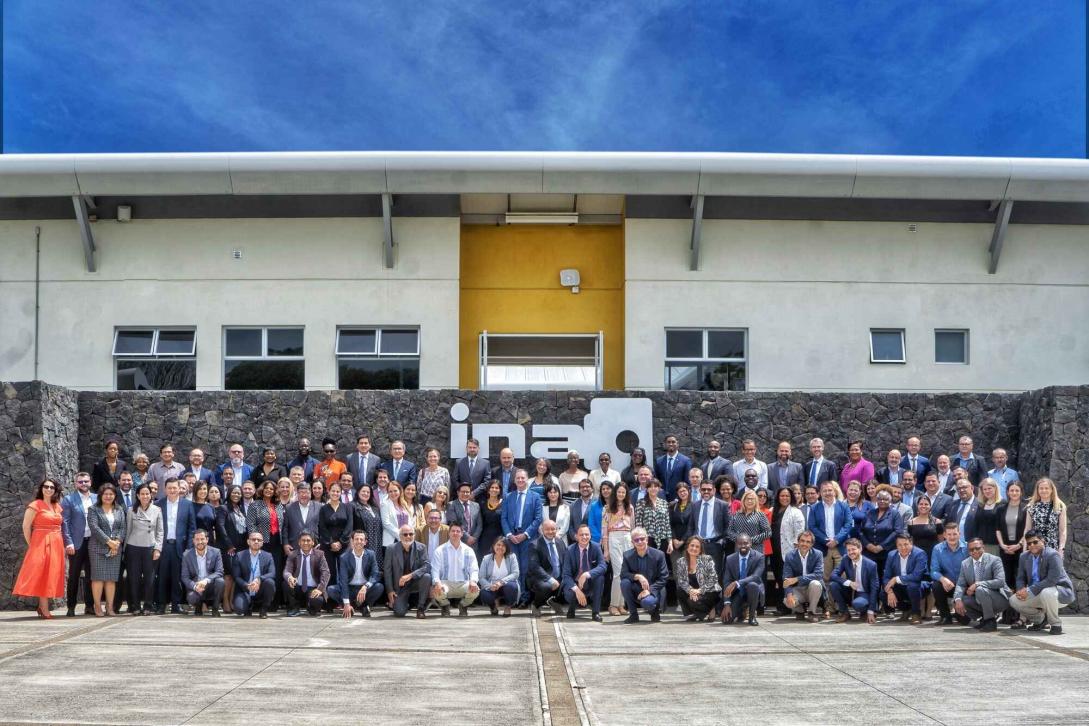EU-LAC Digital Alliance brings eGovernance to citizens and business

Group photo EU-LAC representatives at the Policy Dialogue on eGovernance
Democracies that deliver for the benefit of citizens are based on transparent and efficient public administrations. Information and communication technologies are increasingly being adopted by government agencies in the EU and LAC to create an e-governance model that improves the interactions with members of society and the private sector.
The EU-LAC Digital Alliance Policy Dialogue in San José, Costa Rica, from 15 to 17 May 2024 was convened to improve cooperation in the area of e-government. The goal of the meeting was to define an action plan for increasing interoperability, or exchange of data and processes, among digital public services of LAC countries and with the EU. The dialogue has also contributed to enhance trust for cross-border use of citizen’s electronic IDs and electronic signatures, as key element for interoperability.
This Dialogue is part of a roadmap set by the EU-LAC Digital Alliance launched in March 2023 under Global Gateway, the European strategy to boost smart, clean and secure connections in digital and other sectors across the world.
The meeting offered a platform for governments from both regions to exchange valuable experiences. There are best practices in the region proving that the EU-LAC Digital Alliance delivers on eGovernance.
eGovernance and interoperability
Interoperability is key to realising the benefits of digital transformation. The ability of computer systems to exchange information or interoperate relies on standardisation, data sharing protocols and processes.
Interoperable systems are already yielding successful EU-LAC eGovernance projects. One example is in the Central American Digital Trade Platform, meant to facilitate cross-border interaction with government authorities and simplify trade.Users from six Central American countries are now able to use a web site to manage complex trade operations across countries. Moreover, the port of Algeciras in Spain, which is one of the most important points of entry for EU and Central America imports/exports, is currently exploring how to connect its platforms to it.
More than 10,000 Central American exporting companies are projected to benefit from the platform thanks to Interoperability between IT systems across the region, simplification of processes (automation, harmonisation, mutual recognition), standardisation of databases, sharing of big data, and trade facilitation. It is estimated that it will reduce trade costs by 3.2%.
It also includes interconnection modules for trade, migration, health and customs institutions of Costa Rica, Guatemala, El Salvador, Honduras, Nicaragua and Panama. The platform is a very unique and progressive tool that proves the region’s commitment to economic integration, trade facilitation and digitalisation.
The EU Global Gateway contributed EUR 8 million for the design and implementation of the platform in 2023. The second phase of the project with an overall funding of EUR 5 million will boost cybersecurity and strengthen the platform’s functionalities.

metamorworks/Shutterstock
E-Identity in El Salvador
Digital identity and accurate digital registries are at the core of a human-centric digital transformation as it enables the exercise of basic citizens’ rights for all.
The EU has signed an agreement with the government of El Salvador for the implementation of the project "Strengthening the Digital Civil Register System of El Salvador".
El Salvador urgently needs updating its system for births and deaths registration. These registers are not fully automated nor interoperable, representing a high risk for a number of public processes. It hampers consolidating data into a national statistical system to support public policies focused on the needs of the population.
It also lacks regulation, in particular in the area of data protection.
The project will contribute to a fully-fledged digital civil registry framed by a regulation that enhances access to public services and citizens’ rights.
It will enable the registration of births and deaths, so that all Salvadorans possess a legal identity from birth and full recognition as citizens, easing access to social services and to the justice system.
The EU will be providing specialised technical assistance to the public administration, on the one hand, and also sharing European expertise in policies and regulatory frameworks that ensure the data protection and fundamental rights of citizens.
Women in GovTech
Closing the gender gap is key to closing the digital divide. Scaling up women’s digital skills and professional profiles means they will become agents of change in the digital transition. This has potential to be particularly powerful in the digitalisation of the public administration.
GovStack is an initiative by two EU member states, Germany and Estonia (together with ITU-International Telecommunication Unionand DIAL-Digital Impact Alliance) with growing presence in LAC. With 18 participants from LAC they have launched the first cohort of women in GovTech. They learned to master the skills necessary to develop citizen-centric digital government services, with both technical and soft skills, and accelerate their GovTech careers.
“I envision my role in the digitalization of my country as that of a catalyst for positive change, with a background in technology and a fervent passion for social impact, I am committed to leveraging digital tools and strategies to drive progress and inclusivity.”
Yessenia Pennélope Henríquez
GovTech mentor from El Salvador
The GovStack team and experienced mentors supported participants in designing citizen-centric digital services. The leading projects will be showcased at the World Summit on the Information Society (WSIS) 2024.
EU-LAC Digital Alliance moves forward
The discussions were intended to co-develop a roadmap for bi-regional cooperation on eGovernance and to set concrete steps for a joint regional agenda ahead of the 2025 EU-CELAC Summit.
Participants of the EU-LAC Digital Alliance days in Colombia in November 2023 agreed that collaboration between both regions on digital matters is essential to enhance their strategic autonomy and economic growth.
Participating countries issued a Joint Declaration in the context of the EU-CELAC Summit in July 2023, where they committed to regular bi-regional dialogue and cooperation on digital matters for the benefit of their citizens.
Background
The Dialogue was co-chaired by the European Commission, Costa Rica, Guatemala and Estonia. The opening remarks were delivered by
- Paula Bogantes, Minister of Science, Innovation, Technology and Telecommunications (Costa Rica);
- Edie Cux, Executive Director of the Presidential Commission on Open and Digital Government (Guatemala);
- Felice Zaccheo, DG INTPA, European Commission;
- Ana Maria Busoniu, Director General, Intermediate Body for the Promotion of Information Society (OIPSI), Romania;
- Hannes Astok, Chairman of the Management Board, e-Governance Academy (eGA), Estonia.
- Sealtiel Álvarez Sánchez, Deputy Administrative Manager of the National Learning Institute (INA), Costa Rica
See also:




